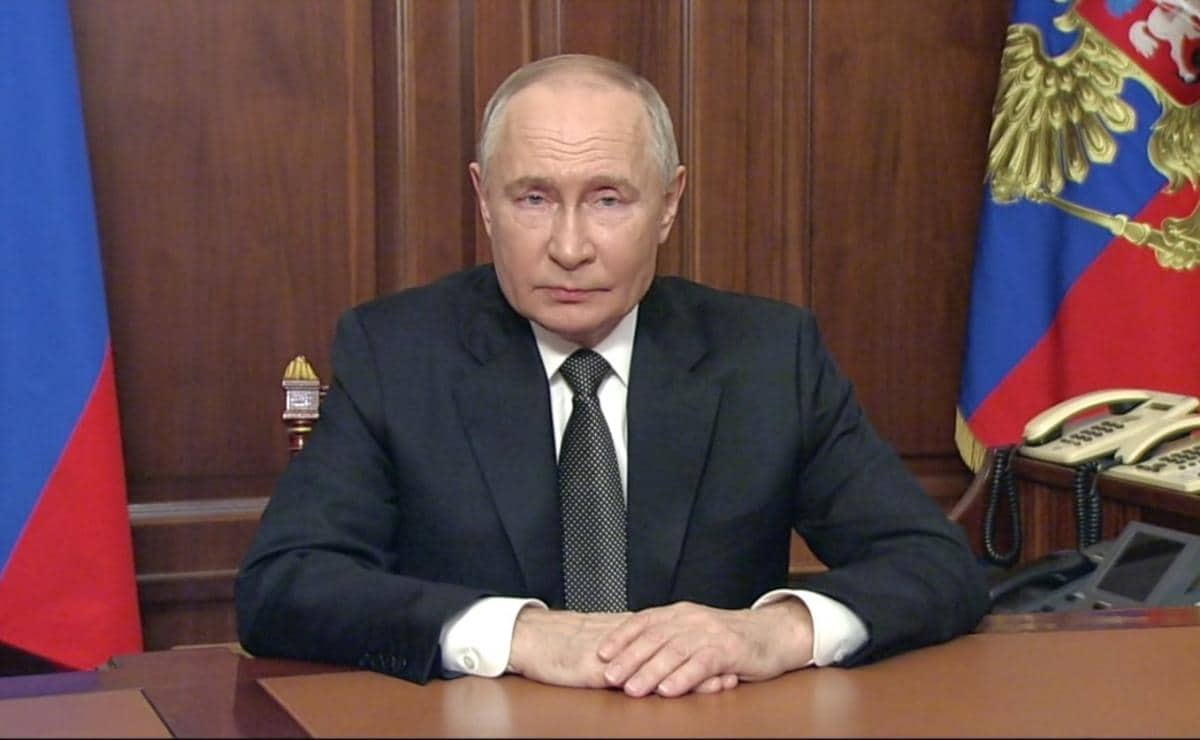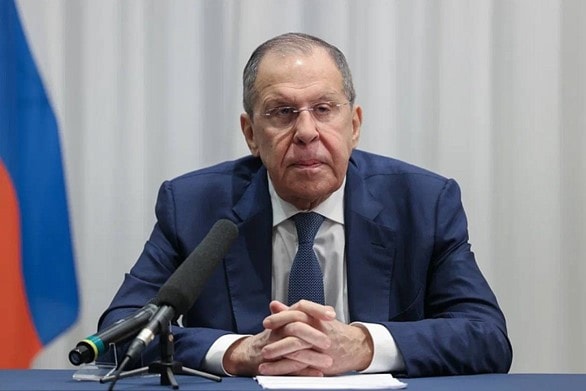On November 21, 2024, in a televised message, Russian President Vladimir Putin said that "the regional conflict in Ukraine provoked by the West has assumed elements of a global nature." He then added: "In response to the deployment of American and British long-range weapons, on November 21, the Russian Armed Forces delivered a combined strike on a facility within Ukraine's defense industrial complex."
"In field conditions, we also carried out tests of one of Russia's latest medium-range missile systems – in this case, carrying a non-nuclear hypersonic ballistic missile that our engineers named Oreshnik. The tests were successful, achieving the intended objective of the launch. In the city of Dnepropetrovsk, Ukraine, one of the largest and most famous industrial complexes from the Soviet Union era, which continues to produce missiles and other armaments, was hit."
Putin also stressed: "We consider ourselves entitled to use our weapons against military facilities of those countries that allow to use their weapons against our facilities, and in case of an escalation of aggressive actions, we will respond decisively and in mirror-like manner. I recommend that the ruling elites of the countries that are hatching plans to use their military contingents against Russia seriously consider this."

Below is Putin's statement:[1]
"We Are Developing Intermediate-Range And Shorter-Range Missiles In Response To US Plans To Produce And Deploy Intermediate-Range And Shorter-Range Missiles In Europe And The Asia-Pacific Region"
President of Russia Vladimir Putin: "I would like to inform the military personnel of the Russian Federation Armed Forces, citizens of our country, our friends across the globe, and those who persist in the illusion that a strategic defeat can be inflicted upon Russia, about the events taking place today in the zone of the special military operation, specifically following the attacks by Western long-range weapons against our territory.
"The escalation of the conflict in Ukraine, instigated by the West, continues with the United States and its NATO allies previously announcing that they authorize the use of their long-range high-precision weapons for strikes inside the Russian Federation. Experts are well aware, and the Russian side has repeatedly highlighted it, that the use of such weapons is not possible without the direct involvement of military experts from the manufacturing nations.
"On November 19, six ATACMS tactical ballistic missiles produced by the United States, and on November 21, during a combined missile assault involving British Storm Shadow systems and HIMARS systems produced by the US, attacked military facilities inside the Russian Federation in the Bryansk and Kursk regions. From that point onward, as we have repeatedly emphasized in prior communications, the regional conflict in Ukraine provoked by the West has assumed elements of a global nature. Our air defense systems successfully counteracted these incursions, preventing the enemy from achieving their apparent objectives.
"The fire at the ammunition depot in the Bryansk Region, caused by the debris of ATACMS missiles, was extinguished without casualties or significant damage. In the Kursk Region, the attack targeted one of the command posts of our group North. Regrettably, the attack and the subsequent air defense battle resulted in casualties, both fatalities and injuries, among the perimeter security units and servicing staff. However, the command and operational staff of the control center suffered no casualties and continues to manage effectively the operations of our forces to eliminate and push enemy units out of the Kursk Region.
"I wish to underscore once again that the use by the enemy of such weapons cannot affect the course of combat operations in the special military operation zone. Our forces are making successful advances along the entire line of contact, and all objectives we have set will be accomplished.
"In response to the deployment of American and British long-range weapons, on November 21, the Russian Armed Forces delivered a combined strike on a facility within Ukraine's defense industrial complex. In field conditions, we also carried out tests of one of Russia's latest medium-range missile systems – in this case, carrying a non-nuclear hypersonic ballistic missile that our engineers named Oreshnik. The tests were successful, achieving the intended objective of the launch. In the city of Dnepropetrovsk, Ukraine, one of the largest and most famous industrial complexes from the Soviet Union era, which continues to produce missiles and other armaments, was hit.
"We are developing intermediate-range and shorter-range missiles in response to US plans to produce and deploy intermediate-range and shorter-range missiles in Europe and the Asia-Pacific region. We believe that the United States made a mistake by unilaterally destroying the INF Treaty in 2019 under far-fetched pretext. Today, the United States is not only producing such equipment, but, as we can see, it has worked out ways to deploy its advanced missile systems to different regions of the world, including Europe, during training exercises for its troops. Moreover, in the course of these exercises, they are conducting training for using them."
"We Consider Ourselves Entitled To Use Our Weapons Against Military Facilities Of Those Countries That Allow To Use Their Weapons Against Our Facilities"
"As a reminder, Russia has voluntarily and unilaterally committed not to deploy intermediate-range and shorter-range missiles until US weapons of this kind appear in any region of the world.
"To reiterate, we are conducting combat tests of the Oreshnik missile system in response to NATO's aggressive actions against Russia. Our decision on further deployment of intermediate-range and shorter-range missiles will depend on the actions of the United States and its satellites.
"We will determine the targets during further tests of our advanced missile systems based on the threats to the security of the Russian Federation. We consider ourselves entitled to use our weapons against military facilities of those countries that allow to use their weapons against our facilities, and in case of an escalation of aggressive actions, we will respond decisively and in mirror-like manner. I recommend that the ruling elites of the countries that are hatching plans to use their military contingents against Russia seriously consider this.
"It goes without saying that when choosing, if necessary and as a retaliatory measure, targets to be hit by systems such as Oreshnik on Ukrainian territory, we will in advance suggest that civilians and citizens of friendly countries residing in those areas leave danger zones. We will do so for humanitarian reasons, openly and publicly, without fear of counter-moves coming from the enemy, who will also be receiving this information.
"Why without fear? Because there are no means of countering such weapons today. Missiles attack targets at a speed of Mach 10, which is 2.5 to 3 kilometers per second. Air defense systems currently available in the world and missile defense systems being created by the Americans in Europe cannot intercept such missiles. It is impossible.
"I would like to emphasize once again that it was not Russia, but the United States that destroyed the international security system and, by continuing to fight, cling to its hegemony, they are pushing the whole world into a global conflict.
"We have always preferred and are ready now to resolve all disputes by peaceful means. But we are also ready for any turn of events.
"If anyone still doubts this, make no mistake: there will always be a response."
Appendix – Russian Foreign Minister Lavrov: "The Multiple Use of ATACMS In The Bryansk Region Last Night Signals A Desire for Escalation"; Mid.ru, November 19, 2024.
As the military conflict in Ukraine continues to escalate, new types of weapons continue to appear on the battlefield. Recently, reports have begun to appear on a lifting of the ban imposed by some Western countries on long-range missile strikes deep into Russian territory. Western arms supplies are a painful topic for the Kremlin, wherein strikes with long-range Western weapons have repeatedly been designated as "red lines" for Moscow.[2] On November 19, the Telegram channel of the Russian Defence Ministry reported a strike on a facility in the Bryansk Oblast with six ballistic ATACMS missiles.[3] Russian Foreign Minister Sergey Lavrov commented on these issues at the G20 summit at Rio de Janeiro.
During a press conference, Lavrov was asked a question about the news of the US authorizing Ukraine to strike deep inside Russian territory with long-range missiles, and comment on a report of 6 ATACMS missiles striking the Bryansk Oblast of the country. Lavrov stated that "The multiple use of ATACMS in the Bryansk Region last night signals a desire for escalation." He then added: "Utilizing these sophisticated missiles without American involvement is unfeasible."

Russian Foreign Minister Sergey Lavrov (Source: Mid.ru)[4]
Following is Lavrov's comment:[5]
Lavrov: "Our Concern Is Our National Security"
Question: "At the summit, did you engage in discussions with representatives from other nations – whether Western or allied – concerning the reported authorization by the Americans to target our territory with long-range missiles? If so, what perspectives did you encounter? In your view, why has neither the American President nor the Secretary of State officially announced this decision, despite the alleged permission and the discussions surrounding it?
"Six ATACMS missiles struck the Bryansk Region. Their precise modification remains unidentified. In your estimation, what could this imply? Is there a connection to the aforementioned discussions regarding permission?"
Sergey Lavrov: "How can I ascertain whether the report by The New York Times is accurate or merely an exploratory attempt? I do not possess such knowledge. The multiple use of ATACMS in the Bryansk Region last night signals a desire for escalation. Utilizing these sophisticated missiles without American involvement is unfeasible. President Vladimir Putin has frequently addressed this issue, cautioning how our stance will shift should the long-range capability (up to 300 kilometers), which is currently under speculation, receive approval.
"In reality, this does not constitute an 'approval' for Ukraine to deploy long-range missiles, but rather an announcement of their intention to strike targets up to 300 kilometers away. I am unable to confirm this, as reports seem to treat it as a foregone conclusion.
"Josep Borrell, the EU's High Representative for Foreign Affairs, stated it is 'now an official matter.' The Europeans have deliberated and resolved that each nation will independently decide whether to permit their long-range armaments to be utilized by the Ukrainians.
"I shall refrain from speculating on that. Today, we have officially released the Fundamentals of the Nuclear Doctrine of the Russian Federation. All pertinent details are confirmed therein and have been codified into law. President Vladimir Putin publicly articulated this on September 12, 2024. I trust that this doctrine will be comprehensively read, not selectively as they do with the UN Charter, but in its entirety and in context.
"Someone inquired of me in private, on the fly: is it true? I responded that I do not know if it is true or not.
"Our concern is our national security. Everything that those contemplating this need to be aware of has been communicated officially, as Russian President Vladimir Putin has affirmed, and it has been officially documented."




